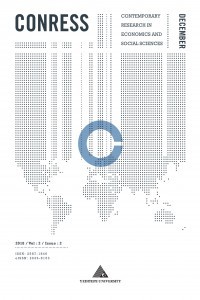An Alternative Design Framework for International Coordination of Banking and Financial Supervision
Avrupa, bankacılık ve finansal sistemini reforme ederek, bankacılık ve finansal hizmetler endüstrisinin denetiminin etkinliğini sağlayacak optimum bir organizasyon arayışı içindedir. Bu makalenin amacı, Avrupa Birliği'ndeki bankaların ve finansal kuruluşların ihtiyati denetimi ile ilgili önemli konulardan bazılarını analiz etmek ve hem Avrupa düzeyinde hem de uluslararası düzeyde düzenlemeyle ilgili endişeleri tartışmaktır. Münferit bankaların veya finansal kurumların başarısızlıklarının yanı sıra sistemik krizlerin sıklığını ve kapsamını sınırlandırmak için, ihtiyati kuralların ve kurumsal düzenlemelerin üye devletler arasında daha uyumlu hale getirilmesini önermekteyiz. Sonuç olarak, üye devletlerin kurallarının, usullerinin ve kurumsal altyapılarının uyumlaştırılmasının ve hem Avrupa'da hem de uluslararası düzeyde koordinasyonun yeni bir kurumsal düzeninin uygulanmasının, tüm aktörler arasındaki bilgi alışverişinin kalitesinde bir artışa neden olabileceğini vurgulamaktayız.
Anahtar Kelimeler:
Finansal düzenleme, finansal denetim, finansal krizler, Avrupa bankacılık ve finansal sistemi, Avrupa
An Alternative Design Framework for International Coordination of Banking and Financial Supervision
Europe is in search of an optimal organization that will enable the efficiency of the surveillance of the banking and financial services industry by reforming the European Banking and Financial System. The purpose of this paper is to analyse some of the important issues concerning the prudential supervision of banks and financial institutions in the European Union and to discuss related concerns about regulation both at the European and international levels. We suggest that prudential rules and institutional arrangements could be further harmonized between Member States to limit the frequency and extent of individual bank or financial institution failures as well as those of systemic crises. Our results underline that the harmonization of rules, procedures, and institutional infrastructures of Member States and the implementation of a new institutional organization of coordination both at European and international levels could engender an increase in the quality of information exchanges between all actors.
Keywords:
Financial regulation, financial supervision, financial crises, European banking and financial system, Europe,
___
- Council of the European Communities. (1992). Treaty of the European Union. Luxembourg: Office for Official Publications of the European Communities.
- Couppey-Soubeyran, J., & Sessin, T. (2001). Pour une autorité de supervision financière européenne. Revue d’économie Financière, 143–160.
- De Larosière, J., Balcerowicz, L., Issing, O., Masera, R., McCarthy, C., Nyberg, L., … Ruding, O. (2009). Report of the high-level group on financial supervision in the EU. European Commission. Brussels.
- Kane, E. J. (1981). Accelerating inflation, technological innovation, and the decreasing effectiveness of banking regulation. The Journal of Finance, 36(2), 355–367.
- Kane, E. J. (1989). The S & L insurance mess: how did it happen? The Urban Insitute.
- Kozanoğlu, M. D. (2007). La Banque Centrale Européenne et la surveillance du système monétaire et financier en Europe (M.A. Thesis). Grenoble University, Grenoble.
- Lannoo, K. (1998). From 1992 to EMU: the implications for Prudential Supervision (Vol. 1998). Centre for European Policy Studies.
- Lawson, J., Barnes, S., & Sollie, M. (2009). Financial market stability in the European Union: Enhancing regulation and supervision. OECD Economic Department Working Papers, (670).
- Padoa-Schioppa, T. (1999). EMU and banking supervision. International Finance, 2(2), 295–308.
- Plihon, D. (2000). Quelle surveillance prudentielle pour l’industrie de services financiers? Revue d’économie Financière, 17–32.
- Schoenmaker, D., & Oosterloo, S. (2007). Crossborder Issues in European Financial Supervision. In The Structure of Financial Regulation (pp. 264–291). London: Routledge.
- Spaventa, L. (2009). Reforms of the world financial system: Can the G20 deliver? Retrieved from http://voxeu.org/article/reforms-world-financial-system-can-g20-deliver
- ISSN: 2587-1846
- Başlangıç: 2017
- Yayıncı: Yeditepe Üniversitesi
Sayıdaki Diğer Makaleler
Electoral Rules, Political Representation and Advocacy Coalition Framework in Turkey
An Alternative Design Framework for International Coordination of Banking and Financial Supervision
Kıvılcım Akkoyunlu Ertan, Birol Ertan
Atina’da Yaşayan İstanbullu Rumların Göç Hafızasıyla Beslenen Kimlik İnşaları
Mülteci Kampları ve Yerleşim Alanlarında Sürdürülebilir Tasarım
